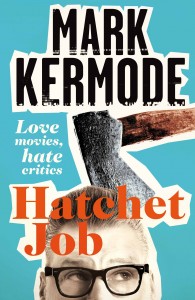The Big Interview: Mark Kermode

Ahead of the release of his forthcoming book, we caught up with the Observer’s new film critic, Mark Kermode…
Kermode on: his new book, Hatchet Jobs: Love Movies, Hate Critics
When I started I’d just written The Good, The Bad and The Multiplex, bemoaning the change of cinema from 35mm projection to digital. It seemed to me with the rise of the internet that the professional as film critic was going the same way as 35mm. Suddenly everybody was a critic and everybody had access. If that was the case, why would anybody want to pay critics and did anybody care what they thought?
When I started writing the book … there were a lot of people I knew, much better critics than I, struggling for work. There was a moment in American criticism a couple of years ago when a number of very established critics lost their staff jobs … and there seemed to be a general move towards wanting to know what real people thought as opposed to what critics thought. Critics were somehow [seen as] elitist – I didn’t think that was the case and I wanted to write about why film criticism was a profession worth following.
I wrote it over 18 months/2 years and during that time I went from being very negative about the future of film criticism to positive. While the medium has changed, the same rules apply: a good film review still consists of knowing what you’re talking about, having a knowledge of cinema and enthusiasm of cinema and writing about film in a way that is factually accurate. It doesn’t matter whether you do that online, in print, on the radio or in TV, the same rules apply.
The other thing the book became about was how important is it for all criticism to be attributed – I’m really only interested in the opinions of people about whom I know something. One of the things that happened [with the onset of blogs] was the rise of anonymous criticism – a review is only worth what the reviewer has to lose, and if you have nothing to lose by expressing your opinions then your opinions have no weight.

Kermode on: replacing Philip French as the Observer’s film critic
My feeling about the Observer is I’ve always had nothing but respect and admiration for it. I grew up reading Philip and he was considered the greatest film critic in the English language… Him and Roger Ebert … were the great irreplaceables. When he retired Philip said he had been honoured to work for a paper that took films seriously and was proud to take film seriously. To take over from Philip French, as I’m sure you know, is an extraordinary thing. [He] took me aside, shook my hand and said congratulations. He then said it’s the best chair in film criticism and I’m profoundly aware of that, and believe me, I take the job very seriously and am fiercely proud of being a professional critic.
Kermode on: Roger Ebert
Interesting thing – when Ebert died there was this great outpouring of respect, love and admiration of his work. Rightly so, he was an absolute giant in the field of of film criticism. Along with that was a lot of stuff about ‘it’s the end of an era’. When Philip French retired, the same phrase kept being taken out and an awful lot of people equated this to the rise of the internet. In an age in which Metacritic is more important, what’s happened to the critic?
The interesting thing about Ebert was he was an early adopter to the web – he won awards for writing for his online blog. Ebert understood that the message was not the medium, the internet was a way of getting his voice out to more people. Astonishingly when Ebert lost the ability to speak as a result of his illness [cancer], his voice was louder than ever and the reason was due to the internet.
Kermode on: the internet
The idea that somehow the internet has brought about the end of criticism was not only wrong but flying completely in the face of the evidence of the person held up as the last great bastion of film criticism.
Writing the book I became profoundly aware of the snobbery in print journalism which is to look down your nose at blogging. There’s a quote about blogging in that film Contagion: “It’s just graffiti with punctuation” – I was in a screening when a load of people laughed at that line, but it was partly out of nervousness: ‘all our jobs are going and the internet’s to blame.’ The internet isn’t to blame, what will happen is the same rules of journalism will apply: people will want some kind of quality control.
That will come from editing and it will come from responsibility and accountability; the thing that will increase your readership is knowing that you’re reliable and accountable for what you say; that you have pride in the work and do the thing professionally. People still haven’t figured out the payment model, but it will be figured out because if it isn’t, capitalism will collapse!
Very quickly the market will take control because that’s how capitalism works and whether you like it or not, things have to be paid for… The market is changing but it’s not disappearing. It’s not going to go anywhere – the internet is run by capitalism the same way newspapers are… It’s not the end of everything, just the changing of the medium.
Kermode on: being on the receiving end of criticism
One of the things that you’re always told as a critic is you have no idea of what it’s like being on the back end of a vile review; to which I would say, err yeah, just google Mark Kermode and *anker and see how far you get. I have been on the receiving end of the most vitriolic abuse. I’ve had stupid actors threatening to beat me up. I’ve had reviews of my books that are absolutely bilious and poisonous. The idea I’ve never been on the end of a bad review is laughable. The idea critics don’t know what it’s like to be on the receiving end is hilarious!
I’ve written a few books now – they’ve had good and bad reviews. It’s one of the things I talk about – why is it the negative reviews stick? I could quote for you the bad reviews of my books but I can’t remember the good ones! When I wrote my autobiography It’s Only a Movie the review in the Telegraph said ‘the problem with this book is it’s all about Mark Kermode’ – you have to take the rough with the smooth. It’s good to be on the wrong side of a bad review because it toughens you up… But remember, the worst piece of crap you ever reviewed, somebody worked hard to make!
Kermode on: the films he’s looking forward to
The thing I’m most looking forward to is the thing I don’t expect, that I don’t know anything about and that isn’t on my radar. By the time Prometheus came out, it was hard for anybody to have not seen half the film already. The thing I’m most looking forward to is the film I have no idea about… It’s the great privilege of film criticism.
Kermode on: not giving the game away
Critics go out of their way mostly to not give plot spoilers away. It is hard. The best way of doing it is to talk about films in terms of code, in terms of genre and relating to other movies. Repeating the plot is not something I’m particularly intersted in anyway– most films aren’t best described by describing the plot; but I’m increasingly aware that people read reviews after they see the film. They don’t want to know in advance… It’s very simple, if you don’t wanna know, don’t read it!
Kermode on: his favourite critics
The person I read most religiously is Nigel Floyd; he’s my oldest friend and he was the person that really got me started. He’s always been the top of the game, whether he’s writing for Time Out or Channel 4. He’s my touchstone. Trevor Johnston’s writing is just beautiful. You read something he’s written and you almost wanna cry because you think ‘I’ll never construct a sentence that’s that good’.
Kate Muir’s got a lovely turn of phrase; Anne Billson, obviously who is primarily an author nowadays. Kim Newman is the top of his game and continues to be. These are all people I read and actually that I know, respect and admire.
Hatchet Job: Love Movies, Hate Critics is available from October 10th





